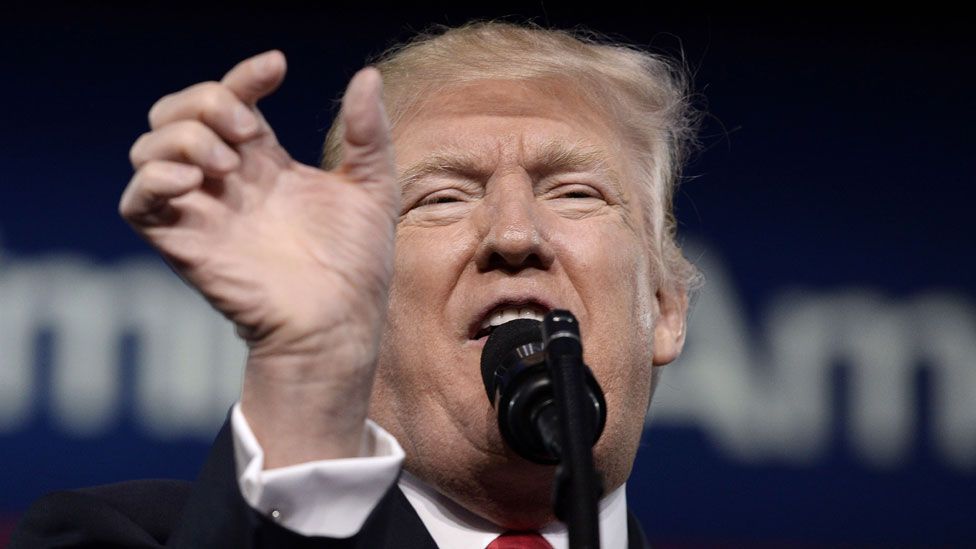Did Trump win because his name came first in key states?
- Published

One of the world's leading political scientists believes Donald Trump most likely won the US presidential election for a very simple reason, writes Hannah Sander - his name came first on the ballot in some critical swing states.
Jon Krosnick has spent 30 years studying how voters choose one candidate rather than another, and says that "at least two" US presidents won their elections because their names were listed first on the ballot, in states where the margin of victory was narrow.
At first sight Krosnick's idea might seem to make little sense. Are voters really so easily swayed?
Most of them are not.
"Most of the people that voted Republican were always going to vote Republican and most of the people that voted Democrat were always going to vote Democrat," says James Tilley, professor of politics at the University of Oxford.
But a minority are.
"There is a human tendency to lean towards the first name listed on the ballot," says Krosnick, a politics professor at Stanford University. "And that has caused increases on average of about three percentage points for candidates, across lots of races and states and years."
Political scientists call this the primacy effect.
It has the biggest impact on those who know the least about the election they are voting in.
You are more likely to be affected, Krosnick says, "if you are feeling uninformed and yet feel obligated to cast a vote - or if you are feeling deeply conflicted, say between Hillary Clinton and Donald Trump."
When an election is very close the effect can be decisive, Krosnick says - and in some US states, such as Pennsylvania, Michigan and Wisconsin, the 2016 election was very close.
"In the states where Trump won very narrowly, his name was also listed first on the ballot in most of those states," says Krosnick.
Some always list parties in the same order. Some allow the state's officials to make a new choice each time. Some put the party that lost in the last election at the top of the ballot. Some list alphabetically.
In 2002, a court overturned the result of the mayoral election in the Californian city of Compton, after hearing testimony about the name-order effect. The judge decided that in this instance, the decision to list one of the candidates first had been deliberate and unfair.
"Candidates whose last names begin with letters picked near the end of the lottery have it tough," Krosnick explained during the Compton court case. "They will never get the advantage that comes from being listed first on the ballot."
There are numerous cases where the primacy effect is thought to have influenced the result of an vote.
In January 2008, Hillary Clinton unexpectedly beat Barack Obama in the New Hampshire primary - part of the long battle to decide which of them would become the Democratic Party's presidential candidate. Professor Michael Traugott from the University of Michigan believes that name order enabled Clinton to pick up extra votes. Her name was at the top of a long list. Obama's was near the end.
Find out more
- Listen to part one of Analysis: How Voters Decide on the BBC iPlayer
- Part two can be heard on Radio 4 at 20:30 on Monday 27 February
The primacy effect can also affect polling.
The exit poll from the 2004 US presidential election led pundits on the night to believe that Democratic Party candidate John Kerry would win, when in fact he went on to lose to incumbent president George W Bush. The poll had listed Democrat candidate Kerry before Republican candidate Bush.
What can be done to prevent the primacy effect? One option is to randomise the ballot papers. The states of California and Ohio have both adopted this system. An equal number of ballot papers is issued with a different candidate at the top of the list. This spreads the benefit of the name-order effect across the candidates.
In 1996, Bill Clinton received 4% more votes in the regions of California that listed him first in the ballot papers than in those where he featured lower down the list.
Research by Robert Darcy of Oklahoma State University shows that, given the choice, most election officials tend to list their own party's candidates first.
In one famous example of this, Florida's rules meant that Republican governor Jeb Bush's brother George W Bush was placed at the top of the list of candidates in his state, in the 2000 presidential election.
Bush went on to win Florida - which turned out to be a decisive state - by a very narrow margin.
"Because of the fact that different states in the US order candidate names differently and idiosyncratically, and almost none of the states do what Ohio and California do which is to rotate candidate name order across ballots to be fair, we have unfortunately had at least two recent election outcomes that are the result of bias in the name ordering," says Krosnick.
"If all of those states had rotated name order fairly, most likely George W Bush would not have been elected president in 2000, nor would Donald Trump have been elected president in 2016."